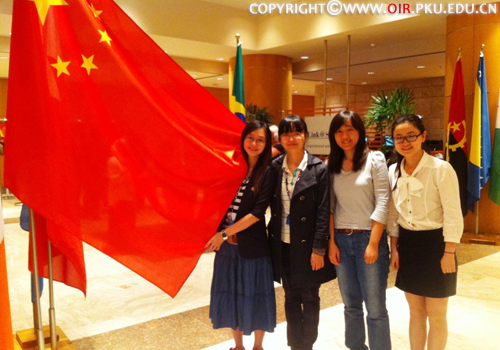Invited by the UN, and generously supported by the Office of International Relations of Peking University, I attended “Rio+20,” the United Conference on Sustainable Development at Rio, as a youth delegate from China.
This conference is titled “Rio+20” because 20 years ago, at the same city – Rio de Janeiro of Brazil, a conference was held. Attended by government officials around the world, the conference led to a pact on environmental issues. By mutual agreement, all the nations that signed this pact promised to take action to guarante a better future for the earth. However, two decades have passed and that promise has not been lived up to; many countries have encountered conflicts over global environmental issues. Therefore, “Rio+20” was held, with the purpose of making up for man’s failure, attempting to recover the lost and urgent time to save our earth.

With the same concerns over global environmental problems as before, people from all over the world gathered together at Rio. Among them, there were government officials, NGO workers, and scholars from universities and institutions from all over the world. People crowded into Rio, causing their numbers to exceed that of the capacity of Rio.
A number of NGO members chose to stay in their own tents on the street, since they did not manage to book hotels in time or could not afford the rocketing room rates. The usually deserted plaza for carnivals was seemingly turned into a camp base. These “grassroots” NGO workers thus had many difficulties to overcome in order to attend the conference. However, due to their personal convictions for environment, they were eager to attend the conference, to understand the future development of environmental efforts.
“Dialogue” was the key word of the conference. Communication platforms were set up between different groups, such as the developed countries and developing ones, experts and the general public, and the young and the old. Different groups also shared their views on the type of future that they are envisioning.
That was precisely why we attended this conference: to know what is happening in the world, and to give others a picture of what the young are doing in China to contribute to a better future. The UN conference was an eye-opening experience. The city was highly armed, with riot police wearing red berets anywhere and anytime to be seen the city; and we could come into close contact with government officials, renowned scholars and celebrities all the time in the assembly rooms.
However, after the initial stage of curiosity had passed, many questions began to fill our minds as we attended the conference: Are the objectives of the conference fulfilled? Who signed this new pact, and can they truly represent the world population of seven billion people? Is it a better pact than the former one signed two decades ago? As the conference came to an end, everyone had their own view on these issues and skepticism about the success of the conference was raised.
It was not long before we realized that we were not alone in our skepticism through our conversations with officials and NGO workers. A delegate handed us a news article which commented on “Rio+20,” entitled “NGO’s Fantasy.” When the conference ended, the high expectations that people had had seemed to remain as fantasies, with seemingly no hope being fulfilled.
A UN staff member, who graduated from Peking University, told us that she saw people from different countries visiting the UN Headquarters every day, but few of them had any clues about what the UN was dealing with. However, this did not seem to matter. They were more attracted by the idea that countries could be united, in spite of discrepancies over political stands, religions and cultures, to solve global problems and together to envision the whole picture of a better future. But the fact is that UN is sometimes only able to stick to abstract ideas, just like this conference. Few concrete agreements are actually made, and even fewer actions are taken to fulfill these agreements.
An ideal UN should be able to garner the actions of governments and individuals, possessing a steady belief for the betterment of the world instead of fulfilling our selfish wants. From Kyoto to Copenhagen, governments have signed many agreements, but the outcomes have been disappointing thus far. And, sadly, “Rio+20” might meet the same fate as well.
What impressed us most was not the official release made by the committee, nor ambiguous promises given by politicians, but a case study that we learnt about of a British research institution helping developing countries with poor technology to build energy models. These models can help local government to maximize the use of their resources wisely and sustainably. This project is a good case of dialogue and communication: Technology and knowledge are shared among different regions for the purpose of environmental preservation and sustainable development.
By Zhong Haoyan

